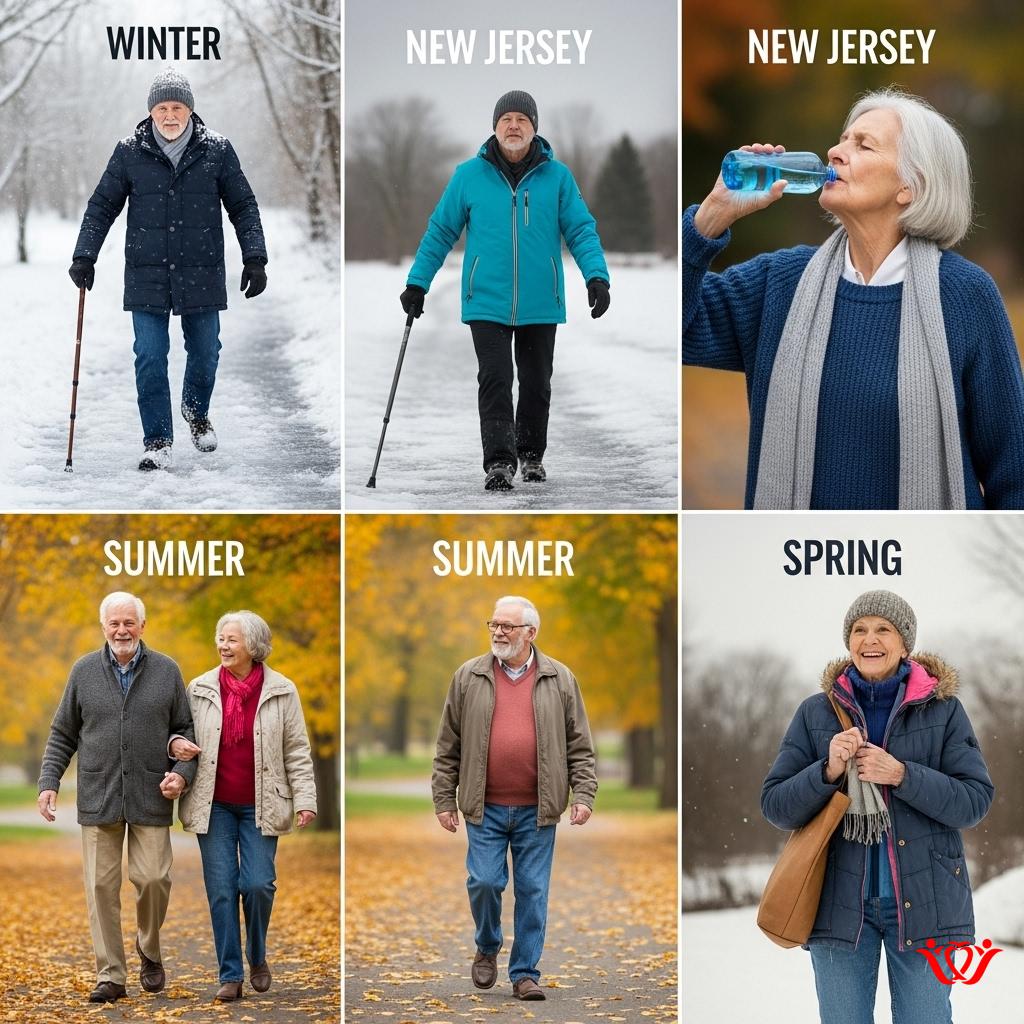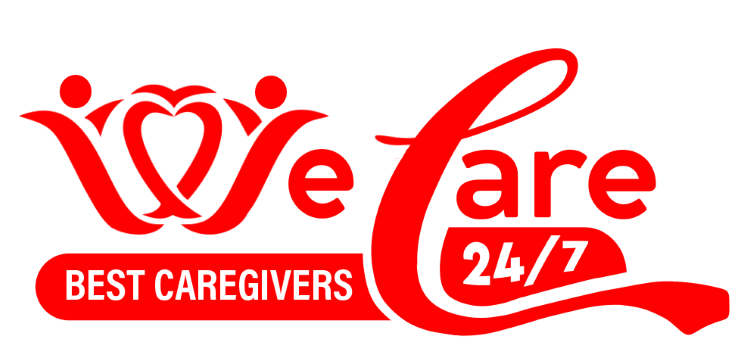5 Essential Seasonal Safety Tips for New Jersey Seniors

Navigating New Jersey’s Seasons: A Comprehensive Guide to Senior Well-being
New Jersey, with its distinct four seasons, offers a vibrant tapestry of experiences throughout the year. From the serene, snow-covered landscapes of winter to the lively, sun-drenched days of summer, each season presents unique challenges and wonderful opportunities for seniors residing in the Garden State. At WeCare Home Caregivers, we deeply understand that maintaining optimal safety, comfort, and independence is paramount for New Jersey seniors, their adult children, and the dedicated caregivers who support them.
Proactively preparing for these seasonal transitions is an essential step towards ensuring a healthy, secure, and fulfilling living environment year-round. This comprehensive guide expands on five critical safety tips meticulously tailored to the unique conditions of New Jersey. Our goal is to empower seniors to thrive, offering invaluable peace of mind to their families and support systems, no matter the weather outside.
1. Prioritizing Home Safety and Emergency Preparedness
A safe and well-maintained home environment forms the bedrock of senior well-being, especially when navigating New Jersey’s diverse and sometimes unpredictable weather patterns. Preparing for emergencies means more than just having a plan; it involves having the necessary resources and knowledge readily available at all times. This includes diligent fire safety practices, reliable carbon monoxide detection, and robust severe weather readiness.
Winter Safety: Warmth, Hazard Prevention, and Power Outages
New Jersey winters can be harsh, often requiring heating systems to work overtime. It is crucial to ensure furnaces, boilers, and chimneys are inspected annually by a qualified professional before the cold season sets in. Regular filter changes in forced-air systems not only improve air quality but also enhance heating efficiency and safety.
Portable heaters should always be used with extreme caution. Position them at least three feet away from flammable materials like curtains, bedding, or furniture, and never leave them unattended, especially overnight or when leaving the house. Ensure they have automatic shut-off features in case they tip over. Additionally, remember to prevent frozen pipes by insulating exposed pipes, especially in unheated areas, and letting faucets drip slightly during extreme cold snaps.
Carbon monoxide (CO) remains a silent, odorless, and potentially deadly threat. Install CO detectors on every level of the home and near sleeping areas. Test these detectors monthly and replace batteries twice a year, typically coinciding with daylight saving time changes. The New Jersey Department of Health provides extensive resources on home heating safety, emphasizing proper ventilation and maintenance to prevent CO poisoning. Staying informed about these risks can significantly reduce household dangers and save lives.
Winter storms in New Jersey can also lead to significant power outages. An emergency power outage kit is essential. It should include flashlights with extra batteries, a battery-powered radio, non-perishable food, bottled water, blankets, and a first-aid kit. Consider having a backup power source, such as a generator, professionally installed and maintained, ensuring it is operated safely away from windows to prevent CO buildup.
Summer Safety: Heat, Humidity, and Severe Storm Readiness
New Jersey summers frequently bring intense heat waves and high humidity, posing significant risks for seniors such as dehydration, heat exhaustion, and heatstroke. Ensure homes have properly functioning air conditioning. If central air is not available, ensure window units are installed safely and efficiently. Familiarize yourself with the locations of local cooling centers, often available at senior centers or community buildings, which provide a safe, cool respite during extreme heat advisories.
Encourage seniors to wear light, loose-fitting clothing, preferably in light colors, and to limit outdoor activities during the hottest parts of the day, typically between 10 AM and 4 PM. Ample fluid intake is critical; offer water, clear broths, and fruit juices regularly, even if they don’t feel thirsty. Monitor local weather reports for heat advisories and air quality alerts, which can impact respiratory health.
Summer in New Jersey also means a higher risk of severe thunderstorms, and occasionally, tropical storms or hurricanes. Have a robust emergency kit prepared, including:
- Non-perishable food (at least a 3-day supply)
- Bottled water (1 gallon per person per day for 3 days)
- All prescription medications and a list of dosages
- Battery-powered or hand-crank radio
- Flashlights and extra batteries
- First-aid kit
- Whistle to signal for help
- Dust mask to help filter contaminated air
- Moist towelettes, garbage bags, and plastic ties for personal sanitation
- Wrench or pliers to turn off utilities
- Manual can opener for food
- Cell phone with chargers and a backup battery/power bank
- Copies of important documents (identification, insurance policies, medical records)
The Ready.gov website offers comprehensive checklists for building an emergency preparedness kit, which is invaluable for navigating potential power outages or evacuation needs across New Jersey. Develop a family communication plan, establishing how family members will contact each other if separated during an emergency.
2. Vigilant Fall Prevention Strategies
Falls represent a leading cause of injury among seniors nationwide, and New Jersey statistics are no exception. According to the Centers for Disease Control and Prevention (CDC), approximately one in four Americans aged 65 and older falls each year. Seasonal conditions in New Jersey can significantly exacerbate fall risks, making proactive prevention strategies absolutely paramount for maintaining senior independence and well-being.
Navigating Seasonal Outdoor Hazards Safely
Outdoor conditions in New Jersey vary dramatically with the seasons, each presenting unique fall risks. In autumn, fallen leaves can create deceptively slippery, uneven surfaces on walkways, driveways, and patios. Winter brings obvious hazards like ice and snow, which demand extreme caution. Encourage the consistent use of sturdy, non-slip footwear with excellent traction, regardless of the season. Rubber-soled shoes with good tread are always a wise choice.
During winter, clearing pathways immediately after snowfalls, or arranging for professional snow and ice removal services, can dramatically reduce outdoor fall risks around New Jersey homes. Consider applying pet-safe ice melt products on icy patches. In spring, frequent rains can make all outdoor surfaces slick, while summer mornings can bring unexpected slickness from dew. Awareness of these changing outdoor conditions, coupled with vigilance, is key. Ensure outdoor lighting is functional and bright, especially near entrances and pathways, to improve visibility during dusk or dawn.
Enhancing Indoor Safety Measures
Inside the home, proper and adequate lighting is essential to prevent trips and stumbles. Ensure all areas are well-lit, paying particular attention to stairways, hallways, and bathrooms. Consider installing motion-sensor lights in dimly lit areas or nightlights in bedrooms and bathrooms for nighttime navigation. A clutter-free environment is equally vital; regularly clear pathways, remove loose electrical cords, and secure all loose rugs with non-slip pads or remove them entirely.
Strategically installed grab bars in bathrooms, particularly near toilets and in showers, and sturdy handrails on both sides of stairways, significantly enhance stability. Professional installation is highly recommended for these fixtures to ensure they can support full body weight. Regular exercise, such as balance and strength training programs recommended by the National Institute on Aging or a physical therapist, can profoundly improve a senior’s stability, gait, and confidence, empowering them to move more confidently and safely within their New Jersey homes. Regular vision checks are also important, as impaired vision can contribute to fall risk.
3. Maintaining Optimal Hydration and Nutrition
Seasonal changes can directly impact appetite and fluid intake, making consistent hydration and balanced nutrition a crucial year-round priority for seniors. Proper nourishment and adequate fluid intake are fundamental for supporting immune function, maintaining stable energy levels, and promoting optimal cognitive health. Seniors are particularly susceptible to dehydration and malnutrition due to various factors, including decreased thirst sensation, medication side effects, and reduced mobility.
Hydration: A Year-Round Necessity for Senior Health
Dehydration is a common issue among seniors, often progressing unnoticed until it becomes severe. In New Jersey’s often hot and humid summers, fluid loss through perspiration increases significantly, necessitating diligent fluid replacement. However, even in colder months, dry indoor air from heating systems can contribute to dehydration. Additionally, seniors might limit fluid intake to avoid frequent trips to the bathroom, especially at night.
Encourage consistent water intake throughout the day, even small, frequent sips are often more manageable than large quantities at once. Keep water bottles or glasses readily accessible. Beyond plain water, clear broths, herbal teas, diluted fruit juices, and fruits and vegetables with high water content—such as watermelon, cucumbers, and oranges—contribute significantly to daily hydration. Limiting sugary drinks, excessive caffeine, and alcohol is also advisable as they can contribute to fluid loss. Family members and caregivers play a vital role by regularly offering drinks and ensuring access to fresh water, making hydration a visible and easy habit.
Nutritional Needs Across Seasons for Resilience
Cold weather, prevalent in New Jersey’s winters, can naturally increase the body’s need for warming, nutrient-dense foods to maintain core body temperature. Hearty soups, stews, roasted vegetables, and lean proteins are excellent choices that provide sustained energy. These can also be easier to prepare and consume, especially if appetite is reduced. In warmer months, lighter, more hydrating meals are ideal. Think fresh salads, an abundance of seasonal fruits, and grilled lean proteins. These options can help seniors feel refreshed and prevent sluggishness due to heavy meals.
Ensuring a balanced diet rich in essential vitamins, minerals, fiber, and protein supports overall health, boosts immune function, and enhances resilience against seasonal illnesses. If food preparation becomes challenging, explore meal delivery services or assistance from caregivers. The New Jersey Department of Health, alongside local senior centers, often provides valuable public health information, including dietary guidelines tailored to various age groups. Consulting such resources, or speaking with a healthcare provider or a registered dietitian, can help tailor nutritional plans to individual needs, addressing any specific health conditions or dietary restrictions.
4. Proactive Health Management and Medication Safety
Effective management of existing health conditions and adherence to medication regimens are paramount for senior safety and well-being, irrespective of the season. However, seasonal changes can sometimes disrupt established routines or introduce new health considerations, such as the onset of seasonal allergies in spring, increased respiratory issues in winter, or the heightened risk during flu season.
Regular Health Check-ups and Essential Vaccinations
Maintaining a consistent schedule of medical appointments with New Jersey healthcare providers is fundamental to proactive health management. These regular visits allow for early detection of potential health issues, monitoring of chronic conditions, and adjustments to treatment plans as needed. Proactive screenings for conditions like high blood pressure, diabetes, and cholesterol are vital for preventative care.
Annual flu shots, readily available across New Jersey at pharmacies, doctor’s offices, and community clinics, are especially important for seniors whose immune systems may be less robust. Additionally, staying current on other recommended vaccinations, such as those for pneumonia, shingles, and tetanus-diphtheria-pertussis (Tdap), can significantly reduce the risk of serious illness and complications. The newest RSV vaccine is also a consideration for older adults. These vaccinations provide an essential layer of protection for New Jersey seniors, particularly during cold and flu season when communal gatherings might increase exposure.
Diligent Medication Management and Safe Storage
Medication errors are a serious concern for seniors, potentially leading to adverse health outcomes. It is crucial to organize medications meticulously using pill dispensers, medication reminder apps, or professional blister packs. Adhere strictly to prescribed dosages, timings, and instructions (e.g., with or without food). Maintain an updated list of all medications, including over-the-counter drugs, supplements, and herbal remedies, to share with all healthcare providers and caregivers to prevent dangerous drug interactions.
Be acutely aware that extreme temperatures, both hot and cold, can significantly affect medication efficacy and stability. Never store medications in areas exposed to direct sunlight, high humidity (like bathrooms), or extreme heat, such as a hot car in summer. Similarly, prevent medications from freezing in winter, as this can degrade their chemical composition. Always read storage instructions carefully on medication labels. For unused or expired medications, follow safe disposal guidelines provided by local pharmacies or the New Jersey Department of Environmental Protection to prevent accidental ingestion or environmental contamination.
If a senior uses an in-home care service like WeCare Home Caregivers, our trained professionals can provide invaluable assistance with medication reminders, ensuring proper administration, and meticulous record-keeping. This adds an important layer of support and safety, ensuring medications are taken correctly and consistently, which is vital for managing chronic conditions and overall health.
5. Promoting Social Engagement and Mental Well-being
While physical safety and health are often primary focuses, mental and emotional well-being are equally, if not more, vital for seniors’ overall quality of life. Seasonal changes, particularly the shorter, darker days of winter or the quiet of summer breaks, can sometimes lead to feelings of isolation, loneliness, or even depression. Fortunately, New Jersey offers numerous resources and opportunities to combat these challenges and foster a vibrant social life.
Combating Seasonal Isolation and Fostering Connection
During the colder, darker months, the temptation to stay indoors and limit social interaction can increase. Encourage participation in indoor activities or group events at local New Jersey senior centers. Many centers in towns across the state, from Trenton to Toms River, offer a rich variety of programs, including exercise classes, craft workshops, card games, book clubs, and social gatherings. These provide vital opportunities for connection, mental stimulation, and a sense of community. Transportation services to these centers may also be available.
Virtual connections through video calls with family and friends can bridge geographical distances and provide daily interaction, especially for those unable to venture out frequently due to mobility issues or inclement weather. Learning to use tablets or smartphones for communication can open up a world of connection. Consider also exploring volunteer opportunities, joining hobby groups, or attending local community events, which are excellent ways to meet new people and stay engaged. Maintaining active social connections is a powerful antidote to isolation and contributes significantly to mental resilience.
Supporting Emotional Health Through All Seasons
Seasonal Affective Disorder (SAD) can affect some individuals during winter due to reduced daylight exposure, manifesting as changes in mood, sleep patterns, appetite, and energy levels. Be observant of these changes in seniors. Encourage safe outdoor exposure during daylight hours, even for short periods, as natural light can boost mood. Consider light therapy under medical guidance for diagnosed SAD. Engaging in cherished hobbies, listening to uplifting music, reading engaging books, or pursuing creative outlets can also provide significant emotional comfort and purpose.
For caregivers and adult children, open communication and active, empathetic listening are invaluable. Create a supportive environment where seniors feel comfortable expressing their feelings without judgment. Encourage them to talk about their concerns and joys. If persistent concerns about mental health arise, such as prolonged sadness, loss of interest in activities, or significant changes in sleep or appetite, do not hesitate to seek professional help. The New Jersey Division of Aging Services provides resources and support networks that can connect seniors and their families with appropriate mental health services, support groups, and counseling tailored to their needs. Remember, physical activity, even light exercise, has a profound positive impact on mental well-being by releasing endorphins and reducing stress.
WeCare Home Caregivers: Your Partner in Senior Seasonal Safety and Well-being
Ensuring the seasonal safety and holistic well-being of New Jersey seniors requires a comprehensive, proactive approach and a compassionate understanding of their unique and evolving needs. By diligently implementing these five essential tips – focusing on robust home safety and emergency preparedness, vigilant fall prevention, optimal hydration and nutrition, proactive health management and medication safety, and vital social engagement and mental well-being – seniors can confidently and comfortably enjoy a safer, healthier, and more fulfilling life in the beautiful Garden State, through every changing season.
At WeCare Home Caregivers, we are profoundly dedicated to providing personalized in-home care solutions that not only support these critical safety measures but also significantly enhance overall quality of life. Whether it’s assistance with daily activities, meticulous medication reminders, nutritious meal preparation, safe transportation, or simply providing engaging companionship, our highly professional and compassionate caregivers are here to offer invaluable support and profound peace of mind to families across New Jersey. Contact us today to learn how we can tailor our comprehensive services to meet your loved one’s unique seasonal safety and ongoing care needs, empowering them to thrive year-round.



